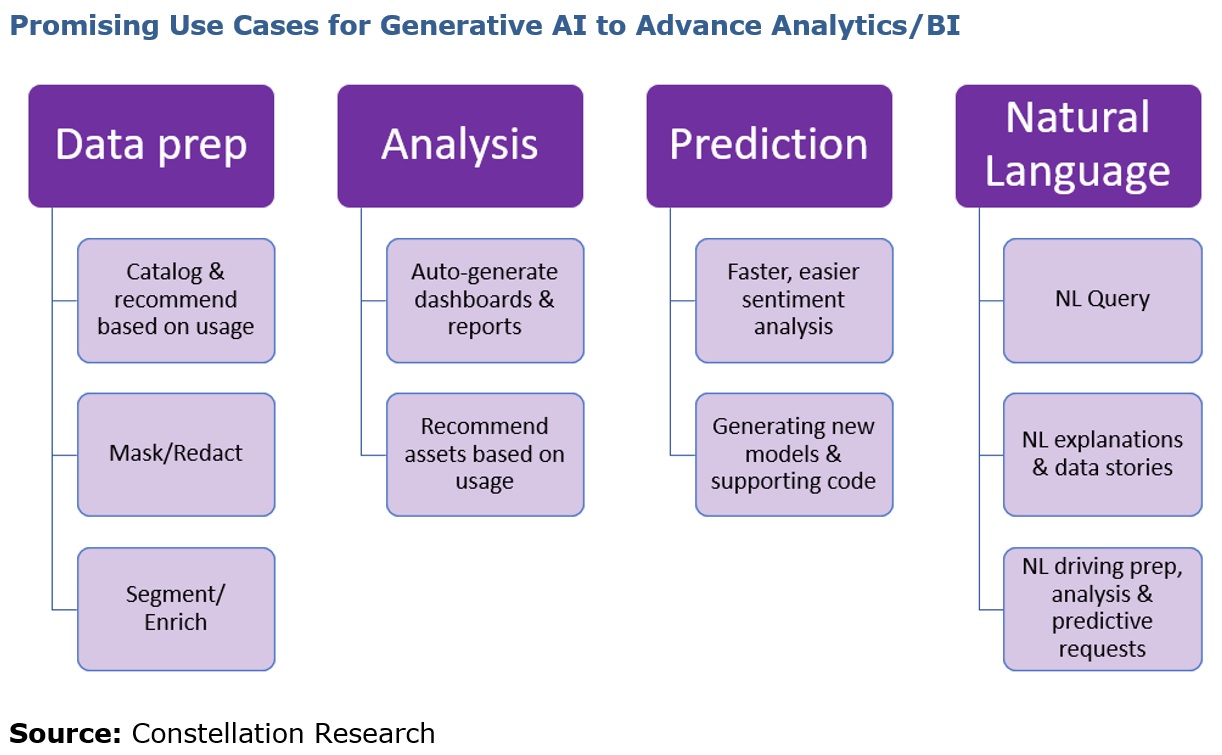I'm wrapping up research for a fresh Market Overivew report on analtyics and business intelligence (BI) products. As in other arenas, the timliest, most potentially game-changing trend in this space is the introduction of Generative AI capabilities. We've already seen announcements from Microsoft, Salesforce/Tableau and ThoughtSpot, and we'll undoubtedly see more. Here's a quick rundown on what to expect.
First off, it's noteworthy that everything is in private preview or limited public preview at this time, which should tell you something. Even a Natural Language to DAX code feature that Microsoft announced for Power BI way back in 2021 is still not technically generally available. On March 16 the company announced Microsoft 365 Copilot, which brings brings new generative AI capabilites to Microsoft productivity apps, Power Apps and Power Automate (though no new features specific to Power BI). I'm expecting to see a bevy of Power BI-related news during the Microsoft Build event in May.
On March 7, Salesforce introduced Einstein GPT in preview. Einstein GPT will be open to using multiple large language models, including OpenAI’s GPT-3, as well as Anthropic, Cohere and perhaps others. Salesforce has demoed use cases for sales, service and marketing and has discussed possible analytical use cases, including better NL query and explanations and better data story telling and sentiment analysis. Release dates are not available and I wouldn't anticipate general availability until the second half of 2023.
ThoughSpot dove into the generative AI world with its March 7 announcement of ThougthSpot Sage. Sage combines ThoughtSpot’s search experience with GPT-3 and, in future, possibly other large language models. ThoughtSpot says the integration offers advantages over generative AI alone because GPT-3 on its own has limitations, such as lacking the context of business context, not handling complex, multi-dimensional schema well, getting confused when there are lots of columns, not handling temporal functions well and, without specific training, generating generic SQL rather than platform-specific SQL. Sage, which is in preview but expected in 1H 2023, is said to overcome these limitations. ThoughtSpot says Sage will improve the company’s NL query and NL explanations and will be able to generate new search data models based on NL input.
Among other vendors, I've seen multiple SiSense blogs on generative AI, but no formal product announcement. I've had conversations with several other vendors who say they're working on the technology, but aren't ready to reveal their plans.

To sum things up in my report, I created the graphic above to explain the types of capabilities to expect. In my view, generative AI has the potential to transform many aspects of analytics/BI products and related administrative and analysis tasks. Again, all the generative AI features that have been announced in the analytics and BI space remain in preview, so caution is advised. Vendors are universally insisting that data-privacy concerns have been addressed and that humans remain in the loop to review AI-generated text or code before it is used. My concern would be that humans will review suggested content for a day, a week or maybe even a month, but will then just fall into the habit of hitting send/share on a chart or natural language explanation. If it's generated code, at least it will (presumably) face the usual QA of rigorous dev and test processes.
Another question that has yet to be answered is just how expensive generative capabilities will be. Large language models are notoriously resource intensive, particularly in the training phase. Customers will want to know which LLMs vendors are using, where those models are running, how their own data is used and, perhaps most importantly, how much it will cost if they turn on generative AI features and see a flood of adoption? Perhaps the cost can be justified if they are seeing a dramatic increase in productivity and breakthrough outcomes?
I'm updating my Cloud-Based Analytics and BI ShortList and I'm publishing out first ever Embedded Analytics ShortList in conjunction with this upcoming report. I'm holding off on an update of our Augmented BI and Analytics ShortList, last published in August 2022, precicely because there are so many generative AI capabilities now in preview that will need a thorough vetting. Hopefully at least a few of them will be generally available in time for our Q3 2023 update.


